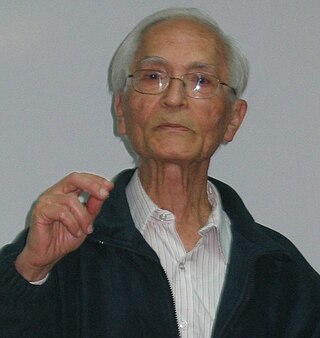Related Research Articles

Butler W. Lampson is an American computer scientist best known for his contributions to the development and implementation of distributed personal computing.

Donald Oscar Pederson was an American professor of electrical engineering at the University of California, Berkeley, and one of the designers of SPICE, a simulator for integrated circuits that has been universally used as a teaching tool and in the everyday work of circuits engineers. The IEEE Donald O. Pederson Award in Solid-State Circuits is named in his honor.

Jacob Ziv was an Israeli electrical engineer and information theorist who developed the LZ family of lossless data compression algorithms alongside Abraham Lempel.
George David Forney Jr. is an American electrical engineer who made contributions in telecommunication system theory, specifically in coding theory and information theory.
Hugh Francis Durrant-Whyte is a British-Australian engineer and academic. He is known for his pioneering work on probabilistic methods for robotics. The algorithms developed in his group since the early 1990s permit autonomous vehicles to deal with uncertainty and to localize themselves despite noisy sensor readings using simultaneous localization and mapping (SLAM).

John Roy Whinnery was an American electrical engineer and educator who worked in the fields of microwave theory and laser experimentation.

Brian David Outram Anderson is Professor in the Research School of Information Sciences and Engineering at the Australian National University. His research interests include circuits, signal processing and control, and his current work focuses on distributed control of multi-agent systems, sensor network localization, adaptive and non-linear control. Professor Anderson served as President of the Australian Academy of Science from 1998 to 2002.

Asad Ali Abidi is a Pakistani-American electrical engineer. He serves as a tenured professor at University of California, Los Angeles, and is the inaugural holder of the Abdus Salam Chair at the Lahore University of Management Sciences (LUMS). He is best known for pioneering RF CMOS technology during the late 1980s to early 1990s. As of 2008, the radio transceivers in all wireless networking devices and modern mobile phones are mass-produced as RF CMOS devices.
Neil H. E. Weste, is an Australian inventor and engineer, noted for having designed a 2-chip wireless LAN implementation and for authoring the textbook Principles of CMOS VLSI Design. He has worked in many aspects of integrated-circuit design and was a co-founder of Radiata Communications.
Joseph Wilfred Goodman is an American electrical engineer and physicist.
Fred Barry Schneider is an American computer scientist, based at Cornell University, where he is the Samuel B. Eckert Professor of Computer Science. He has published in numerous areas including science policy, cybersecurity, and distributed systems. His research is in the area of concurrent and distributed systems for high-integrity and mission-critical applications.
David Albert Hodges (1937–2022) was an American electrical engineer, digital telephony pioneer, and professor of electrical engineering at the University of California, Berkeley.
Pravin Pratap Varaiya was Nortel Networks Distinguished Professor in the Department of Electrical Engineering at the University of California, Berkeley.
David Skellern is an Australian electronic engineer and computer scientist credited, along with colleagues, for the first chip-set implementation of the IEEE 802.11a wireless networking standard.
Mangalore Anantha Pai was an Indian electrical engineer, academic and a professor emeritus at the University of Illinois at Urbana–Champaign. A former professor of electrical engineering at the Indian Institute of Technology, Kanpur, he is known for his contributions in the fields of power stability, power grids, large scale power system analysis, system security and optimal control of nuclear reactors and he has published 8 books and several articles. Pai is the first India-born scientist to be awarded a PhD in electrical engineering from the University of California, Berkeley.
Marcela Bilek is a Professor of Applied Physics and Surface Engineering at the University of Sydney, Australia. Her research interests focus on the use of plasma related methods to synthesise thin film materials and modify surfaces and interfaces. She was named Fellow of the American Physical Society in 2012 and Fellow of the Institute of Electrical and Electronics Engineers (IEEE) in 2015 for contributions to the science and application of plasma processes for materials modification and synthesis.
David Abramson is an Australian computer scientist. He has been Director of the Research Computing Centre at the University of Queensland, Australia, since 2012. He has been involved in computer architecture and high performance computing research since 1979.
Branko Celler was an academic at the University of New South Wales. In 2010–2011 he was Executive Dean of the College of Health and Science at the University of Western Sydney, and was then in a number of senior positions with the Australian Commonwealth Scientific and Industrial Research Organisation (CSIRO) at Epping (Sydney), NSW, from 2011 to 2014.

Professor Branka Vucetic is an Australian-based expert in coding theory and its applications in wireless technology. She works at the University of Sydney where she holds the positions of ARC Laureate Fellow, Peter Nicol Russell Chair in Telecommunications, and Director of the Centre of Excellence in Telecommunications.
References
- ↑ "2015 elevated fellow" (PDF). IEEE Fellows Directory. Archived from the original (PDF) on 30 March 2015.
- ↑ "David Taubman FTSE". Australian Academy of Technological Sciences and Engineering. Retrieved 11 October 2023.